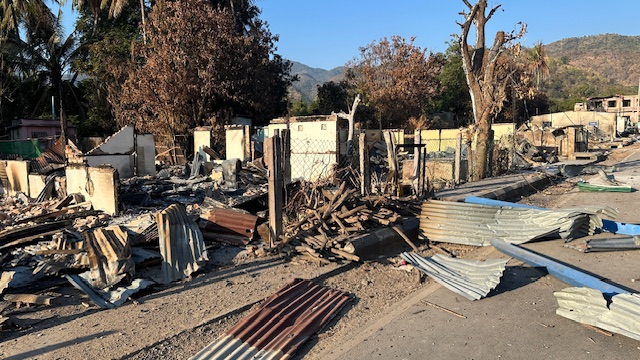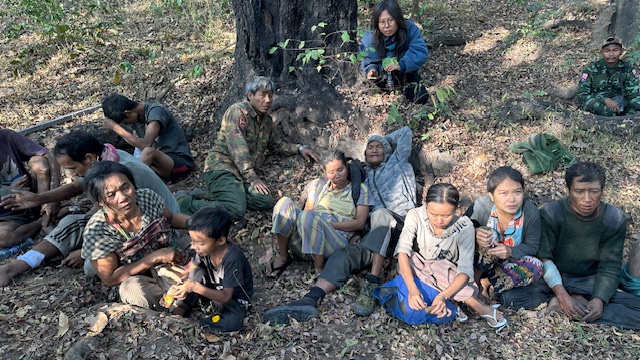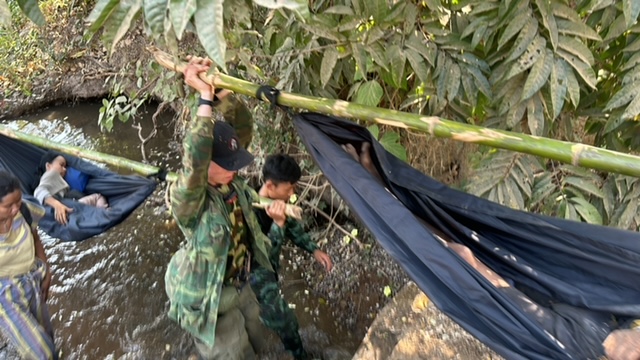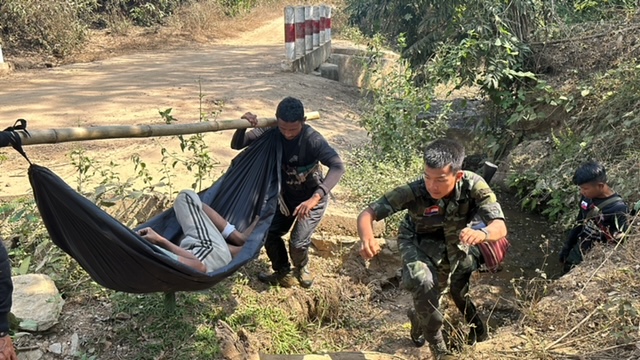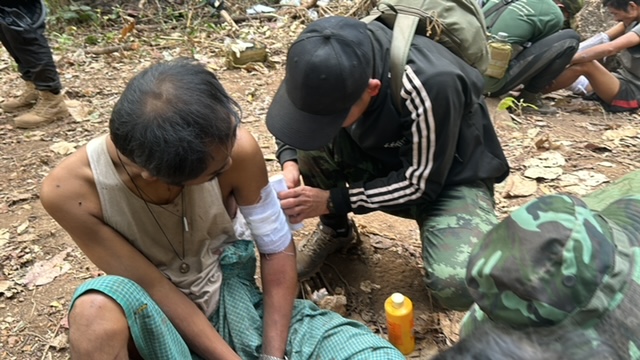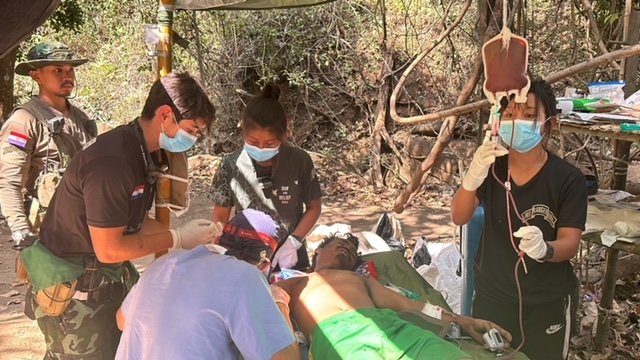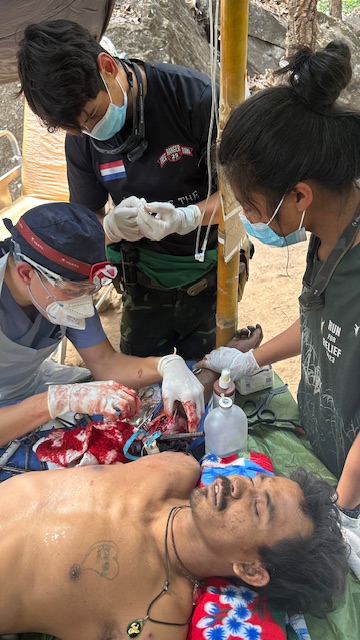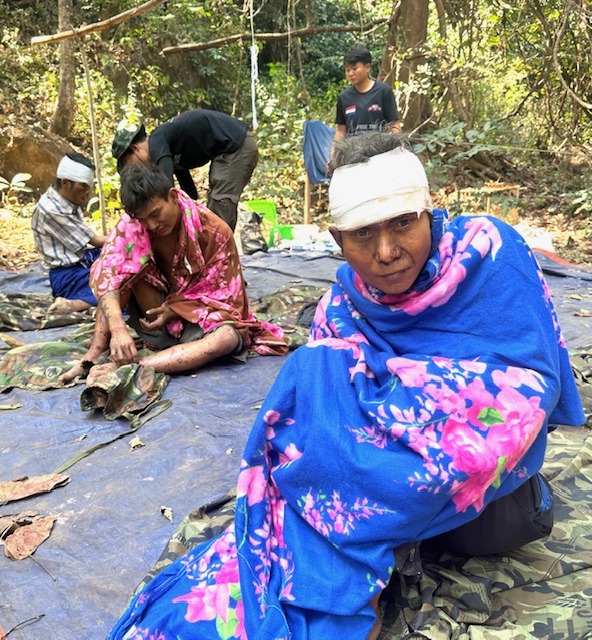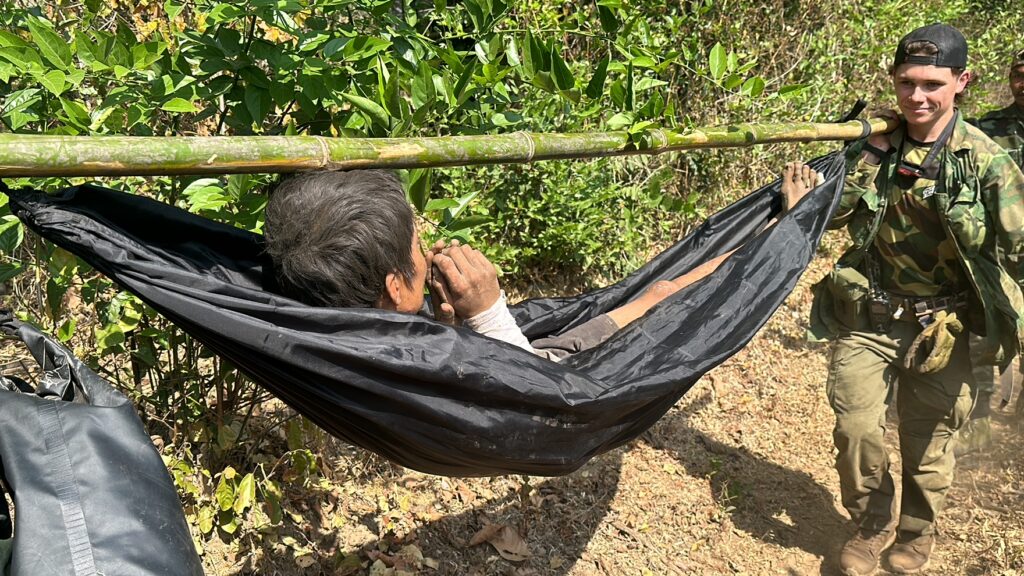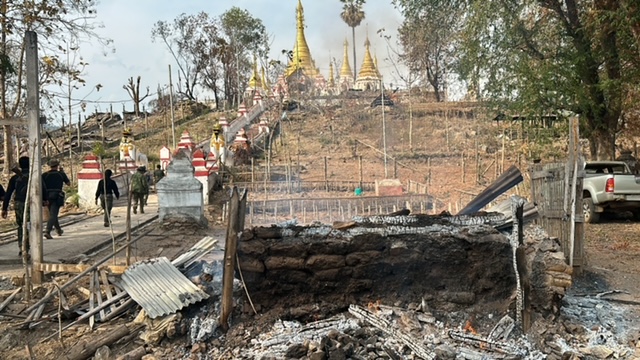Giving Blood to the Enemy: When your Enemy Surrenders What Do you Do?
15 February 2024
Shadaw, Karenni State, Burma
Dear friends,
Thank you so much for your love and prayer for us, especially these past few months, as we have been under multiple airstrikes, artillery, mortar, and ground attack by the Burma Army here in Karenni State, Burma. Last month we put out the report, “Giving Blood on the Front Lines,” documenting the life-saving help our teams provided to many wounded by the Burma military. Since then, there have been daily air and ground attacks by the Burma Army in different parts of Karenni State and southern Shan State. In between providing medical care, we’ve also done over 10 Good Life Club (GLC) programs for displaced people. These are always times of joy, when we can sing, dance, pray with, and give help to people who have fled the Burma Army.
Since the coup in Burma three years ago, over 3 million people have been displaced and thousands have been killed. During this mission, not only was there heavy fighting between resistance forces and the Burma Army, but the Burma military regularly attacked civilian populations in both their villages and in hiding places where they had fled fighting. Jet fighters, heavy mortars, and artillery kill and maim people here every day. Families are gunned down the moment they step into range of Burma Army troops. Last week three mothers and their three children stumbled into the Burma military in a rice field. They were all killed by rifle and machine gun fire. During a GLC program, Burma Air Force jets streaked over and dropped bombs in the distance. We didn’t know what they were hitting until the program was over. Thankfully we hosted the GLC in a place the planes could not see us and we had camouflaged everything we could.
After the program we went to where the bombs had hit. The jets had done six passes and bombed two different schools in adjacent villages. Four children were killed, nine wounded, and six adults were wounded as well. Along with these devastating losses, the villagers also lost the use of their schools, lost multiple livestock – which are a cornerstone of their economy – and just feel unsafe in their homes. Praise God the children were practicing their emergency evacuation drill when the planes came or many more may have been killed. They jumped into trenches that their parents and teachers had dug in preparation for such an attack. Unfortunately, even in the trenches some of the kids were hit and killed. We did our best to comfort the families and the next day attended the mass funeral. It was sad to see the children in their coffins and see the torment on the faces of their families. This is the environment the people of Burma live in and we serve in.
It makes it very hard to love or pray for your enemies when they act like this. Seeing these vicious attacks, it’s hard to not hate the Burma military. We have lost 60 of our Rangers since FBR was founded. Of those, we lost half in the last three years. Losing our friends and colleagues cuts us deep. It makes us wonder how can we obey Jesus’ command to love our enemy when confronted with such evil. The answer is that we cannot, not on our own. But we can ask Jesus to help us. We can surrender to Jesus; surrender our hate, our fear, and our loathing. This is what we pray for every day before we set out on mission.
Last week, local pro-democracy resistance groups, the Karenni National Defense Force (KNDF) and Karenni Army, asked us to provide medical support as they tried to push the Burma Army out of the town of Shadaw in Karenni State. The Burma Army camp in Shadaw was terrorizing the population. The camp commander had issued a challenge to all resistance forces, saying, “Come here if you dare, I’ll kill all of you.” Soldiers from this camp were responsible for gunning down the three mothers and three children and they would attack any other locals they could find. As we approached the town, we saw the destruction that jet fighters and bombers had done to the civilian homes. In the middle of the smoldering wreckage sat a pagoda with the Burma Army camp dug in all around it. The soldiers in the camp shot at anyone who dared approach. Because of this, the villagers had emptied the town, fleeing to the surrounding valleys and mountains, anywhere they thought might be safe. Even so, the jets continued to bomb the homes and began to bomb the neighboring valleys, ridges, and hilltops as well. They were hunting people.
The Karenni resistance wanted to stop the bloodshed. Three times they offered the Burma military the chance to surrender, saying, “We have surrounded you. We don’t want to kill you. Please surrender, you’ll be treated well. Join us for a new Burma.“ Three times the Burma military answered with mortars and airstrikes. Finally, the resistance forces decided enough was enough and resolved to stop them for good. We went to help treat any wounded from the battle. We set up a hidden clinic in the jungle nearby and then designated a forward casualty collection point and rescue teams. At dawn the fighting began with rockets, mortars, bullets and, grenades flying and everywhere a nonstop crescendo of exploding metal. During the fighting, Karenni troops and our rescue teams carried wounded soldiers out through a gauntlet of fire. The wounded were carried to our casualty collection point where our Rangers stabilized them, put them on hammock stretchers, and carried them back to our hidden clinic. There, our skilled surgeon, Tom, as well as other FBR nurses and medics, treated the wounded. 10 Karenni soldiers were wounded during the fight, but all of them survived due to the excellent treatment by our medics and doctor.
The Karenni forces assaulted the camp and within an hour they had taken it. As the position began to fall, we saw wounded enemy soldiers surrendering. In total, 33 Burma Army soldiers were brought out of the camp. Along with them came four women and three children, two of whom were orphans. They were the families of several of the soldiers and local police. The look of terror on all the captives’ faces, the dust and blood on their clothes, and the wounds of the soldiers, was pitiful to see.
As we evacuated them out of the battle area, jets came in and began to bomb all around the captured camp. Following them in were transport planes dropping mortar rounds and bombs. We hid from the airstrikes in a small grove of trees at the end of town. For two hours, the airstrikes continued landing all around us. Altogether, we counted 32 airstrikes while we hid with the prisoners. The wounded Burma Army soldiers and family members huddled together in terror.
We told them, “Don’t be afraid, we’re not going to hurt you. But your air force will kill everyone, soldier or not, in Shadaw. See, this is what the people of Burma have been facing these last three years. For the ethnic people it’s been over 70 years! Now you know what it feels like. The cause of the dictators is lost. Please give up on that idea, rooted in force, control, greed, and hate. We are not better than you. We’re just people, but God has made us to love each other and help each other. We came here because of Jesus’ love, and we forgive you, and we give you a chance to live differently, please take it. Pray to Jesus he will help change your heart. Right now we will treat your wounds. We will get you out of here. We’ll take care of you, but we first have to survive this attack together.“
One of the women grabbed my boot and began to whimper as another airstrike came in. Another lady began to cry, her son on her lap with wide eyes. One of the women huddled with her wounded husband, who was a police captain. They held each other‘s hands and looked into each other‘s eyes, and I could feel the love they had for each other. It was very touching. Watching them reminded me no matter what evil they’d been a part of they weren’t all evil. They truly loved each other, and in that moment I loved them too.
As the jetfighters came in, screaming over us and releasing their bombs just over our heads, I gathered the couple to me with both of my arms and shielded them with my body the best I could. Our team followed my example, shielding their former enemies with their own bodies. The bombs hit with huge metallic crashes and we felt the pressure wave as some of the fragments hit branches above us. As the attack went on, we could see the jets and bombers were working a pattern that was slowly creeping in our direction, first with impacts landing 300 meters away, and then 200 meters, and then 100 meters, and the last impacts only 40 meters away. We should’ve been killed, but we were in a piece of low ground that dipped up behind big trees. However, the next hit would kill us. We had to move.
We got on the radio and called Peter, who was helping coordinate evacuation from the hidden clinic in the jungle. We asked him to get as many stretcher teams as possible and come to us. The previous two days we had done reconnaissance of the route from the town to our clinic. Ethan and Peter had found a covered and concealed way to move and now they used that path to get to us. We loaded up those who could not walk and we began the procession out. Every time we heard a plane dive we stopped and hid in the bushes. Every time the plane passed we got up and moved as fast as we could carrying our wounded enemies.
About 100 yards before the clinic, the Burmese woman who had been holding hands with her husband collapsed in front of me. She had no more strength and was overwhelmed by fear. She lay there crying, oblivious to the world around her. I picked her up, put her on my back, and carried her the rest of the way. When I set her down she began to cry and put her hands up together in prayer and said, “Thank you, thank you. God bless you, God bless you, God bless you.“ I helped her get to her husband, and they held hands again and looked into each others eyes. Again, I could see the deep love they shared. I could also guess at their worries and fears: that they may be killed, or maybe the husband would be killed for supporting the dictators as a police officer. They didn’t know if this was the last moments they were sharing together. Seeing the love they so obviously showed for one another I hoped that they could change, that they could put the cause of the dictators behind them. We all mess up, we all need change. Thank God we have Jesus to help us change when we can’t on our own.
We gathered all the wounded prisoners together and began to treat them. We secured them so they would not try and hurt us and gave them food and water. We told them about the love of God and I told them I did not know of any prisoner captured by the Burma military who was left alive. There were many serious injuries, and doctor Tom performed several life-saving surgeries. One of the wounded had lost a lot of blood so one of Rangers, named Barnya, volunteered to give his blood to the Burma Army soldier. He lay down and looked straight at his former enemy as he gave the blood. The nurses and medics and the doctor then administered the transfusion, saving the soldier’s life. This was blood given for the enemy out of love, not spilled by the enemy in hate.
The Burma Army soldiers and families could see their circumstances were different then they had expected – we were not going to kill them. Both they and us received gifts that day. Their lives were spared and we had a chance to practice loving our enemy. We got to be a part of God‘s answer to hate – love. It’s easy to hate your enemy, it’s hard to love and forgive him. But it is the only way that hearts really change for the better. As I write this, I choke up with tears thinking of the children the Burma military killed outside their schools. I can’t help but ask God, “Where is the justice, Lord, what do we do?” I think I know what to do in those moments. In my anger I want to take justice into my hands. But that is my way, not Jesus’ way. I have to say, “God, help me give my anger to you,” and go step by step.
Some of the team asked me “How can we help these people with what they have done to our team members and families?”
I said “I don’t know. What I do know is Jesus told us this one thing ‘Do unto others as you would have done onto you.’ What does that mean for us?”
There are many Burma Army soldiers, like the regimental commander, who chose to die and chose to kill on their way to dying. It’s hard to love enemies like that. But we pray and hope that all the Burma Army soldiers see the futility and evil of their ways. We pray that when they experience mercy it will break their hearts. That they will not only love each other, like the police husband and wife, but they will learn to love others that are different than them. That is my hope for Burma. We are such small and unworthy vessels in this and our motives are often impure and tainted. Sometimes we can’t even understand them. But in spite of our sins, our mistakes and weaknesses, we say, “Lord Jesus, you know what’s wrong with us please forgive us and help us see the right way. Help us to do the right thing and help us be part of your kingdom on earth as it isn’t heaven.”
Thank you dear reader for your interest in Burma and your prayers. The following are some photographs from the medical evacuation, treatment, and care for our friends and enemies. We love you very much and we feel your love.
Thanks and God bless you,
Dave, family and FBR
